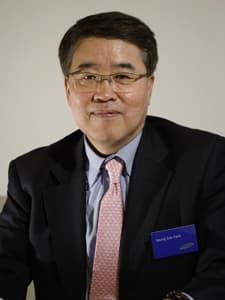New Samsung camera with artificial intelligence planned – Interview with SS Park
Samsung convention, Vienna. 24 March 2009.
- Promise of artificial intelligence
- Sector to account for 20% of camera market
- Samsung only at phase one of domination plan
- GX to continue alongside NX series
Samsung?s upcoming NX hybrid camera system will bring huge innovation to the camera market in terms of design, ease of use and the features bodies in the range will offer, according to the vice president of Samsung?s camera business Seung Soo Park. Speaking exclusively to Amateur Photographer editor Damien Demolder during the Samsung European Forum in Vienna, Austria, on 24 March, SS Park explained that the Korean electronics giant is only at the very beginning of its plan to dominate the photographic market while it slowly establishes brand awareness with its GX system of digital SLR cameras. Phase two will see the company introducing ?huge innovation?, before achieving a dominant position at the head of the market in phase three.
Park was keen to reveal very few specific details of the camera expected to be released in the second half of this year, and repeatedly stressed that ?nothing is fixed yet?. With at least three months before the launch Park insisted that Samsung did not want to tie itself to specification already, and that not releasing information enables the company to remain more flexible about what the first camera will and won?t contain.
‘Seemless experience’
Although not being drawn into confirming anything, Park agreed that the NX series would fit in with Samsung Electronic?s ?Seemless Experience? concept for the interconnected home where multiple devices can be connected to operate together. Earlier in the day Samsung?s European President and CEO, Sang Heung Shin, had spoken about the company?s drive for ?converged products that blend technology? before introducing new internet-enabled WiFi TVs that come with a new photo gallery application. It is likely that the new NX series will be designed to be linked to this type of living-room-based TV, though probably via an HDMI cable at this stage, rather than wirelessly.
Artificial intelligence
When asked what sort of innovations we should expect SS Park explained the potential of artificial intelligence in cameras. ?DSLRs are still very difficult for first timers to use, so we are working very hard to produce cameras that are helpful and not intimidating.? he said. ?Making choices about apertures and focusing is very complicated, and many people do not want to have to do it.?
To give an idea of the magnitude of what Samsung intends to do he explained that vacuum cleaning robots are very common in Korea, and went on to talk about the revolution in microwave oven technology where the ovens are able to weigh food and cook it automatically, and the bar-code system that instructs the oven how to treat a pre-packed meal. He promised that the NX cameras will have ?a highly developed user interface? that will help users make decisions and will even make the decisions for them, suggesting a level of automation not seen before in the camera market.
 Hybrid = 20% of market
Hybrid = 20% of market
SS Park said the hybrid sector is going to be very important, and that the ?industry? expects it to eventually account for 20% of the entire camera market by 2012 ? at which point Samsung aims to be the market leader. He hinted that once Samsung has established it?s own position other brands will be invited to manufacture under licence, though it was not clear whether he meant other companies making parts, lenses and accessories for the Samsung NX series or whether the ?standard? would be made open in the way that the Four Thirds and Micro Four Thirds specification is shared amoung members of the system.
What was clear though is that Samsung will be manufacturing its own lenses from the beginning, and that all the components of the cameras will be Samsung-made, including the APS-C sensor. Park?s predecessor, Byung Woo Lee, stated in a – world exclusive interview with Demolder in August 2008 – that the sensor to be used would be the same 23.4×15.5mm 14 million-pixel CMOS unit that is used in the Samsung GX20 and Pentax K20D, but Park would not be drawn on the subject this time.
GX future
In that August 2008 interview Byung Woo Lee had stated that Samsung?s GX series would run alongside the new NX hybrid, and SS Park indicated that this would indeed happen. The impression though was that the two camera systems would run in parallel, each with a complete range of high and low end models that would effectively overlap. When Samsung launched the GX series with the GX10 it stated that future plans only included high-end DSLR models, but SS Park seemed surprised at this and made clear that this is no longer the case. Park stated that the camera division?s focus at the moment is the NX project, but there would be another GX camera when the current GX20 is ready to be replaced. Eyes must be on manufacturing partner Pentax for the timing of this, as it will coincide with the replacement of the Pentax K20D – which is likely to occur this summer.
Rear screen and EVF
In an interview with SS Park at the PMA show AP was told that the NX series would carry ?the best EVF available? but he would go into no more detail. A clue to what might be expected though could be found in the new LED TVs that Samsung launched in Europe at the Vienna Forum. These screens are extremely thin, have exceptional viewing angles and refresh at up to 200 times a second. Such a refresh rate avoid the colour drag issues that the 60Hz LED screen in the Panasonic G1 Micro Four Thirds camera suffers from when tracking movement across the frame.
Samsung is also developing OLED technologies and has already used high-resolution wideangle-view screens such as the AMOLED (active matrix organic light emitting diode) unit used in the NV24HD compact camera.
The first Samsung hybrid NX series camera is expected to be launched in the early part of the second half of 2009.








